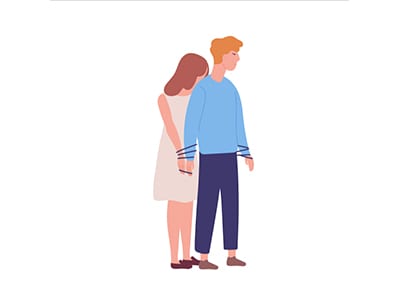Codependency involves behavior where a loved enables their family member or friend’s harmful behavior, whether that’s addiction, mental health challenges, poor health conditions or other choices.
While enabling someone on certain levels can be positive, such as supporting a person in their efforts to mature and become self-sufficient, it can also be very damaging when one person in the relationship struggles with addiction.
When a codependent relationship exists between a loved one and a person struggling with addiction, it tends to be a negative relationship. The enabling co-dependent may unwittingly perpetuate the destructive behavior by covering for the addicted person to keep them out of trouble or to keep peace in the family. Although it’s not their conscious intent, the co-dependent is actually encouraging the other person’s addictive behavior to continue.
Codependency is a difficult cycle to break. The addicted person relies on the co-dependent to enable behavior they feel unable to stop, while the enabling co-dependent bases their identity on being a caretaker. The result can be devastating: a person who desperately needs treatment becomes unmotivated to seek it, while a loved one’s sense of purpose prevents them from guiding their loved one to the help they need.
Are you in a codependent relationship?
It can be difficult to recognize a codependent relationship. Often, the enabling person grew up in a dysfunctional family, where they learned to repress their own needs to take on the role of caretaker. As an adult, the role has become deeply engrained. It is important for the enabling co-dependent to seek help in overcoming destructive behavior patterns, both for their own good and to support their addicted loved one in their own recovery.
Does any of the following apply to you and your relationship with an addicted loved one?
- You lie for or cover up behavior to keep them out of trouble.
- You have loaned them money or bailed them out of jail.
- You take care of things for them they should be handling themselves.
- You feel responsible for their behavior.
- You find it hard to say no when they request something of you, even if you don’t feel like agreeing.
- You keep quiet to maintain peace in the household.
- You, and possibly other family members, tiptoe around the addicted person, and find your own moods are greatly influenced by that of the person struggling with addiction.
Breaking the cycle of codependency
Recognize that you, the addicted person and other affected family members all need help, including addiction education and support. Family members can find valuable information and support with 12-step groups like Al-Anon, Nar-Anon, Co-Dependents Anonymous (CoDA) and Alateen. The CoDA website gives helpful information on recognizing the signs of codependency, and how to find a meeting.
Gather information on local Alcoholics Anonymous (AA) or Narcotics Anonymous (NA) meetings and encourage your addicted loved one to attend. Encourage them to participate in family counseling. Even if your addicted loved one refuses to seek help, don’t let that stop you. Ask your physician or mental health therapist for a referral. The more you learn and heal, the more likely your addicted loved one is to seek their own healing.
Turning Point of Tampa’s goal is to always provide a safe environment and a solid foundation in 12-Step recovery, in tandem with quality individual therapy and groups. We have been offering Licensed Residential Treatment for Addiction, Eating Disorders and Dual Diagnosis in Tampa since 1987.



